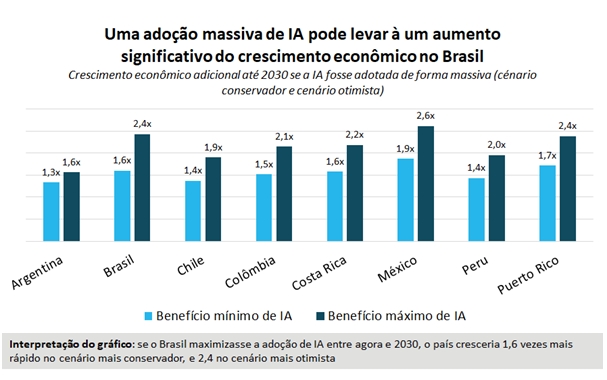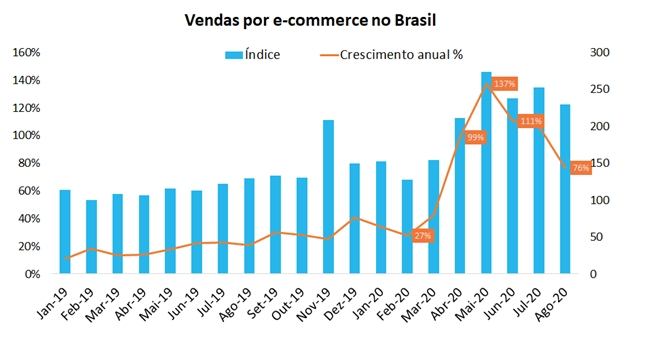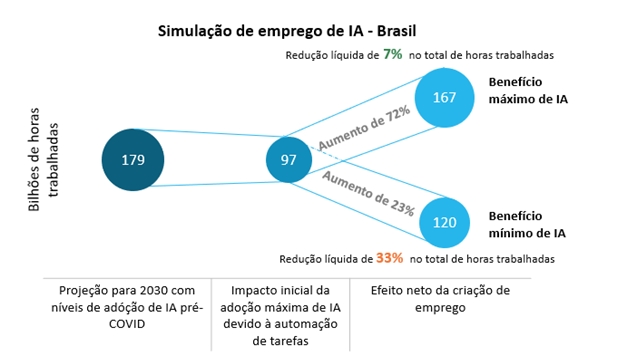Study commissioned by Microsoft from consultancy FrontierView shows that if the country strongly adopts the technology, the recovery from the effects of the COVID-19 pandemic may be faster - both in the economy and in the productivity of Brazilians
At the request of Microsoft, the American consultancy FrontierView carried out the study “Artificial Intelligence (AI) in the era of COVID-19: Optimizing the role of AI in job creation and economic growth in Latin America”, to analyze how the economy, productivity and jobs in Brazil could benefit if the country maximized the adoption of AI by 2030 - this scenario became more likely with the acceleration of the digital transformation that occurred during the COVID-19 pandemic. According to the analysis of the consultancy, the country can experience two different scenarios: the minimum and the maximum benefit with the full adoption of AI, which differ while investment Brazil can generate in the expansion of existing and new industries through the implementation of new technologies. In the first scenario, the use of AI is expected to add 1.8 percentage points to Brazilian GDP by 2030; in the second scenario, additional growth could reach 4.2 percentage points. Both scenarios assume that the country will adopt all the AI functionalities currently available until 2030. The second scenario assumes that companies and the government use AI to expand their operations (not just to automate tasks), and that the labor market in the Brazil can meet the demand for new jobs enabled by AI. The study was done for the first time last year (see on here) and now the consultancy has done an additional analysis from the perspective of COVID-19.

The new coronavirus pandemic has had negative impacts on the country in terms of employment and business, leading some companies to close. However, there was a positive growth curve in the digital transformation of both companies and society, which started to buy digitally - two scenarios that can motivate the adoption of AI. E-commerce sales in Brazil, for example, more than doubled from April to August compared to the same period in 2019 (+ 105% annual increase), as shown in the graph below. Although retail sales are expected to return intensely, many consumers will choose to continue shopping online, contributing to the evolution of virtual retail numbers in the post-pandemic reality.

“Artificial Intelligence has an immense potential to transform business and our society, but to benefit from these opportunities, we need to ensure that it is conducted in an ethical, responsible and accessible manner. For this reason, Microsoft remains firm in its commitment to democratize the use of AI, to understand its impacts and to ensure that people are prepared to make use of this technology ”, says Tânia Cosentino, president of Microsoft Brazil.
According to the analysis of the study, Artificial Intelligence can be a tool to assist the country in the economic recovery, reducing costs, improving tax collection and stimulating the release of credit to move the economy. AI can accelerate the formalization of the informal worker through digital platforms, effectively expanding the tax base and improving tax collection. According to data from IBGE, the informality rate in the quarter ended in August was 38%, which is equivalent to 31 million workers who work on their own or have no formal contract. Other benefits could be seen in combating tax evasion, empowering tax inspectors with forecasting tools that can help them more easily identify fraudulent behavior; the adoption of AI to forecast deficits in tax revenue and the economic impacts of different budget allocations or fiscal incentives.
The Fintech industry is already using AI to eliminate many of the human biases and ineffective solvency assessments that were hampering access to credit not only for certain income and social groups, but also for small and medium-sized companies with credit capabilities, especially those operating in the informal sector.
To contextualize Brazil's position in relation to Latin America, the research analyzed Argentina, Chile, Colombia, Costa Rica, Mexico, Peru and Puerto Rico. From a country-by-country perspective, Mexico, Brazil and Costa Rica would see the biggest leaps in economic growth attributed to the adoption of AI, and Argentina the lowest.
“Our research points out that Artificial Intelligence can be a driver of Brazil's economic recovery after the COVID-19 pandemic. With the right strategies and investments, the country can increase its economic growth and increase the productivity of the population ”, says Pablo Gonzalez Alonso, Research Director for Latin America at FrontierView.
AI and jobs
The study also analyzed the impacts that Artificial Intelligence can generate on jobs, taking into account not only the effects of work automation, but also the creation of new jobs. The general model predicts that of all the hours that Brazilians will work in 2030 based on pre-COVID-19 projections, 46% of them can be automated with the use of AI. However, the creation of new jobs would mitigate the final effect on the demand for labor. In the scenario of minimum AI benefit, the demand for labor would recover from 46% of the reduced (or saved) working hours to 23%; and in the scenario of maximum AI benefit, in which the government and companies are not only using it to automate work tasks, but also to expand their reach and operations, the demand for labor would recover from the same initial reduction of 46% for a net reduction of just 7%.
The FrontierView study found that a reduction in demand for workforce would not automatically lead to job losses in all cases. According to the consultancy, companies could assign new tasks to employees who had their hours reduced, or even reduce the workload thanks to the productivity gains that AI offers; this would also be in line with the growing demands of employees for a better work-life balance.

It is important to point out that for Brazil to achieve the Maximum AI Benefit scenario, it is necessary to encourage its adoption to improve products and services in the public and private sectors, leading to business expansion and greater access to public services. This would increase the demand for labor with the initial impact of AI and increase the demand for technology-focused professions in all industries.
Still in the context of jobs, in the scenario of maximum benefit, the demand for highly qualified professionals would increase significantly, going from 34% of the total jobs to 54% by 2030. In this scenario, the qualification and requalification of professionals become essential, because other levels would go through a decrease in the offers for workers of medium (-31%) and low qualification (-44%). In the minimum benefit scenario, highly qualified jobs would increase their proportion by 16 percentage points, from 34% to 50% of the total jobs by 2030.
In the analysis of Latin American countries, Brazil has the second greatest opportunity to increase its productivity growth and to equate it to that of developed countries in the region right after Mexico, which occupies the first position, - as tasks are automated low added value and thanks to the qualification of workers. This is based on current levels of productivity by industry and occupation in the country, and assuming that Brazil can match the United States' productivity levels for the same industries and occupations thanks to the full adoption of AI and the widespread qualification of its strength of work.
Requalifying the market
In order to take advantage of the potential brought by AI and the demand for qualified professionals for new technologies, Brazil should not rely only on existing and new graduates in courses in this area, it is necessary to requalify the population.
According to analysis by FrontierView, Brazil should focus on improving the training of its workforce and creating an innovation environment to accelerate AI adoption while ensuring equal access to AI technology and inclusive implementation. It is necessary to encourage the participation of women in the areas of STEM (Science, Technology, Engineering and Mathematics, in Portuguese), access to education for all Brazilians regardless of socioeconomic background and access to technology by all companies, regardless of size.
To address these challenges, Microsoft launched initiatives that seek to assist in professional training and retraining and reinforce the company's commitment to the country. In October, the Microsoft Mais Brasil program was presented, in which one of the initiatives is aimed at professional requalification. This is the “Escola do Worker 4.0”, a remote education platform developed by the Special Secretariat for Productivity, Employment and Competitiveness of the Ministry of Economy (SEPEC / ME) in partnership with the Brazilian Industrial Development Agency (ABDI), which includes Microsoft courses through the Microsoft Community Training tool. The platform will be available to Brazilians across the country and aims to serve up to 5.5 million job seekers by 2023. Microsoft will provide 58 instructors to offer personalized guidance to up to 315,000 people.
Microsoft also announced in October the availability in Brazil of a program with LinkedIn to train people with free courses. The global program, which is now supported in Portuguese, offers 9 learning routes and brings together a total of 96 training courses that were designed according to the most demanded professions and most desired skills in the market, taking into account both technical skills, as well as so-called soft skills. The program was launched globally in July in English, French, Spanish and German, having reached, so far, about 10 million people. Our goal is for the program to reach 25 million people worldwide.
To discuss the impacts and opportunities brought by AI, Microsoft created the AI Industry Board, a committee that aims to discuss the ethical and responsible use of Artificial Intelligence, in which representatives of several companies and organizations in the country debate what are the challenges and opportunities brought about by the adoption of technology. The meetings discuss topics such as the economic recovery process, how technology can boost business and that the requalification of skills focused on emerging technologies is essential to benefit from the potential brought by them.






